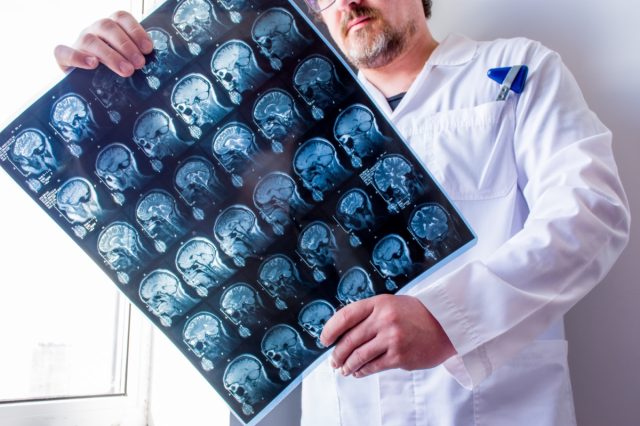According to the World Health Organization, 55 million people worldwide live with dementia, "a syndrome in which there is deterioration in cognitive function beyond what might be expected from the usual consequences of biological ageing." Damaged brain cells cause dementia and it will affect the way a person thinks and behaves. While there's no cure for dementia, there are ways to help reduce the symptoms. Eat This, Not That! Health spoke with experts who explain what to know about dementia and seven ways to help slow it down.
What Causes Dementia?

Dr. Barry Sears, President of the non-profit Inflammation Research Foundation says, "The underlying cause of dementia is age-related inflammation and the structural damage that comes from that unresolved inflammation in the brain."
Who is at Risk for Dementia and Why?

Dr. Sears states, "The best predictor of future dementia (in addition to age) may be increased insulin resistance that leads to diabetes. This is why many neurologists consider Alzheimer's to be 'diabetes type 3.' Another risk factor is a genetic mutation in the ApoE gene that makes it difficult to transport omega-3 fatty acids into the brain."
How Dementia Can Affect Overall Health and Quality of Life

"Maintaining general health and quality of life requires mental effort," says Dr. Sears. "If cognition is compromised, then the quality of life will rapidly decline.
What Should People Know About Dementia?

Dr. Sears states, "The time to be concerned about dementia is before it occurs. Your diet will have a significant factor in reducing its development."
Reduce Insulin Resistance

According to Dr. Sears, "The first sign of increased insulin resistance is weight gain. Thus, losing excess body fat and getting it off is a primary task. Following a calorie-restricted anti-inflammatory diet rich in fruits and vegetables is a good starting point."
Get Your Omega-3s

Dr. Sears shares, "The average American consumes about 100 mg of long-chain omega-3 fatty acids (EPA and DHA) daily. They should be taking about 3 grams (3000 mg). Omega-3 fatty acids are the building blocks of powerful hormones (resolvins) that reduce inflammation in the brain and other organs."
Exercise

"Exercise activates the master switch of metabolism (AMPK) that reduces insulin resistance," says Dr. Sears.
The Centers for Disease Control and Prevention states, "Physical activity is anything that gets your body moving. Each week adults need 150 minutes of moderate-intensity physical activity and 2 days of muscle strengthening activity, according to the current Physical Activity Guidelines for Americans. We know 150 minutes of physical activity each week sounds like a lot, but you don't have to do it all at once. It could be 30 minutes a day, 5 days a week. You can spread your activity out during the week and break it up into smaller chunks of time."
Maintain Cognitive Practices Like Reading

Dr. Sears states, "Reading instead of passive watching causes cognitive improvement. This is especially true of subjects that are new to you."
Reduce Stress

"Stress increases the hormone cortisol which in turn increases insulin resistance," Dr. Sears explains. "Any type of stress reduction activity is good for the brain."
Anti-Inflammatory Diet

Lisa Richards, a nutritionist and author of the Candida Diet tells us, "Our diet has a greater impact on brain health than we often realize. An anti-inflammatory diet that focuses on fruit, vegetables, whole grains, lean protein, and healthy fats is one way to aid in brain health. By reducing inflammation in the body and increasing the amount of plant compounds consumed you can prevent and reduce oxidative damage caused by free radicals. This is due primarily to the antioxidant impact these plant compounds have at the cellular level. Healthy fats like those from lean protein and plant sources can help to reduce inflammation while simultaneously fueling the brain with the type of fat that benefits it the most. Both of these dietary descriptions can be achieved through a plant based diet."
Building Cognitive Resources

Dr. Ramandeep Sidhu, Board-Certified General Surgery, Vascular Surgery and founder of Vivaa says, "This tip for preventing and delaying dementia is based on this simple rule: the more you know, the more there is to forget. Keep learning something new and exciting. Travel around and make memories. If experiencing hearing impairment, use a hearing aid but make sure not to limit your social interactions as this will help build your cognitive resource and delay the effects of cognitive decline from becoming too pronounced."
No comments:
Post a Comment